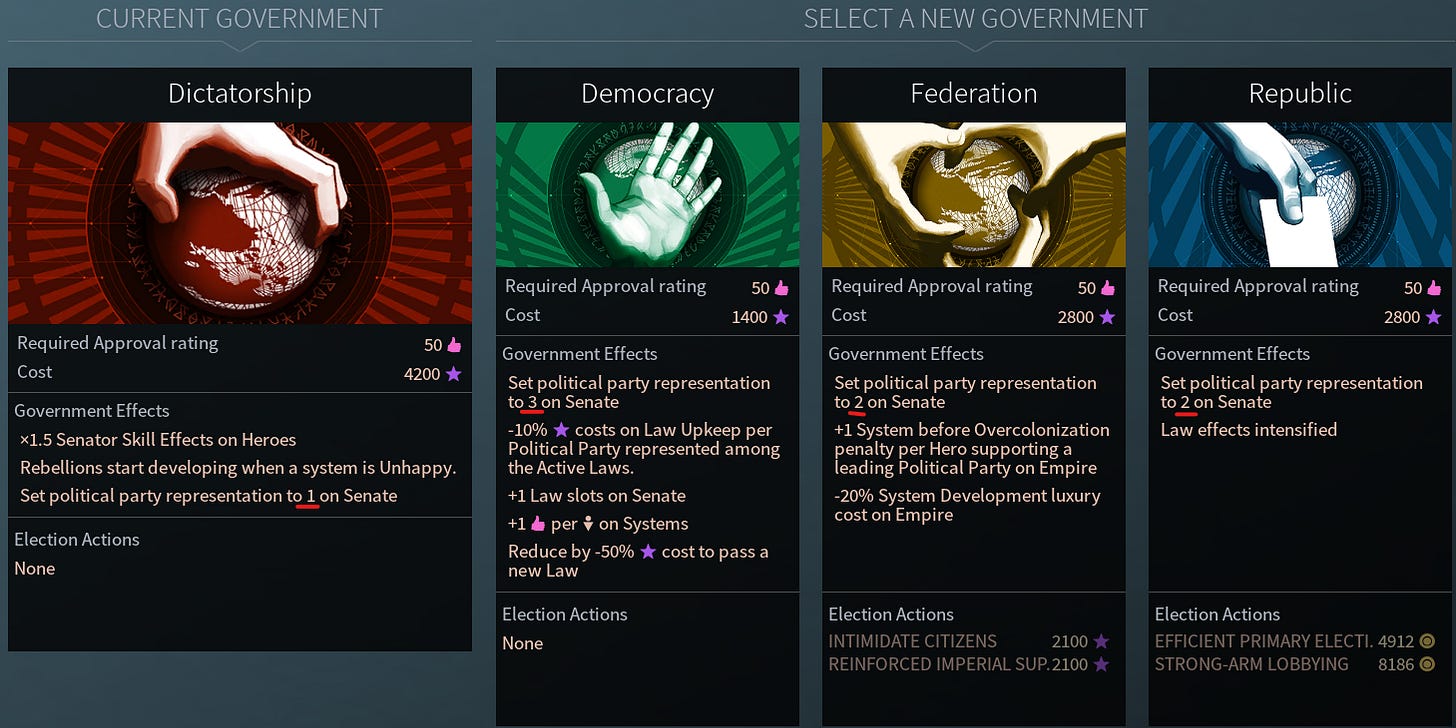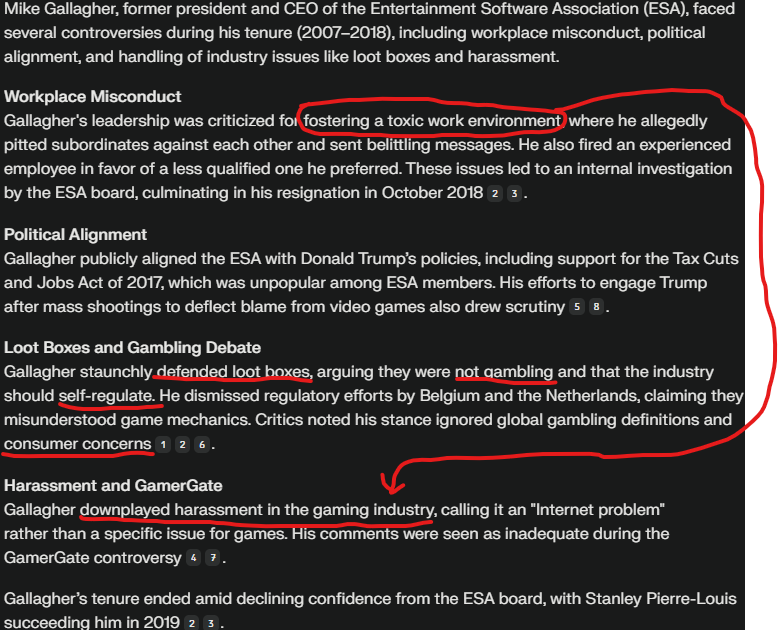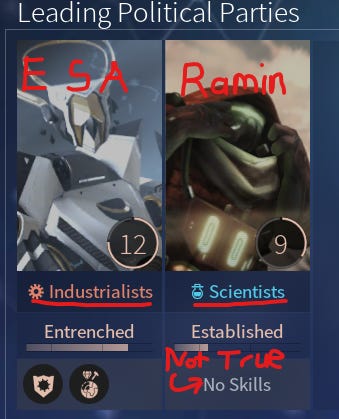113A. Using 4X to Explain Gaming Leadership
Consumers increasingly feel that gaming industry leadership is out of touch, and are reacting by not buying AAA games. Here I explain the divide using 4X gaming analogies.
I am a huge fan of the Civilization series, and credit it with motivating me to switch to economics later in life as my career. I got to work on two Civ games and even met Sid Meier, which was a huge bucket list moment. The later Civ games (VI and VII) were aimed at increasingly international audiences and this required being a bit less honest about how some politically sensitive topics were discussed, like government types.
As in 4X games, every government type has it’s advantages and disadvantages. My purpose here is not to promote any one government type, but to explain what governing choices were made in the gaming industry, why, and how they have dictated the trajectory of AAA since 2003.
Playing a dictator in a game like Endless Space 2 (Amplitude Studios, 2016) is a lot of fun. ES2 is one of my favorite games and I still play it. The political system is done so well that it really adds a lot of value to the gaming experience. Politics are complicated and it’s hard to represent it in gaming so I’m going to lean heavily on ES2 to explain some real world systems that might be hard to get without using an analogy.
As a Druid, playing as Horatio (an Ecology faction led dictatorship) is my jam:
In the game every population in the galaxy is modelled as being in one of six factions as you can see here. In real space, I would say the ecology faction is probably the weakest and least organised in the world. Religious, militarists, and industrialists seem to be most in vogue.
The key thing I want to show in the above screenshot is that in a Dictatorship you only have one of those factions in power, and that never changes. Elections are meaningless. In a 4X game like ES2, that’s actually pretty fantastic. You don’t have to deal with the chaos of leadership changes, and you can take actions on the map without any need to consider how people might feel about those actions.
I only get to pass Ecology themed laws, which can be a pretty huge disadvantage, but one I’m willing to endure.
So only one leader, of one faction, is allowed in a Dictatorship. In other government types you might have the top 2 or even top 3 (in the case of Democracy) factions in power and then you get access to the laws from those additional factions. Laws are very powerful ES2, and the leaders themselves get access to huge buffs as they level up. But those leaders only get to use those buffs if they are an elected leader. So a dictator only gets to use the buffs from one leader. In a Democracy you could get buffs from 3 leaders.
But then you would have to endure the uncertainty of elections, and have to be more accountable to your people. Or in the real world, your consumers.
AAA Leadership: The ESA
In the early days of gaming, before it even went online there was a loose leadership alliance called the Interactive Digital Software Association (IDSA). By 2003 that had morphed into the Entertainment Software Association (ESA) and the AAA membership in the ESA accounted for 90% of industry sales. All the big names were part of the ESA.
The purpose of the ESA is to act as a collective voice for game developers and to promote their interests to both the public and to governments. It is empowered to send lobbyists to various governments (but especially the USA) to try to influence the passage of laws that benefit them.
Laws that would most affect the gaming industry would be laws that might regulate it’s behavior. There are some kinds of regulations that companies actually like. Big companies like regulation that favors big companies and protects them from competition from small companies. Like “Intellectual Property” rights advocacy which gives rights to whoever can afford the most lawyers.
I would say that by 2009 (and especially after the 2013 ICPEN Summit where I was the primary witness speaker) the primary purpose of the ESA was to block regulation of consumer hostile activities the gaming industry had fully embraced. This would include loot boxes, other gambling mechanics, and the “dark patterns” that are mentioned in the Digital Fairness Act. The DFA was the product of the 2013 ICPEN summit and another 12 years of work since then by regulators. Proper regulation is very tedious and time consuming work.
Hmm, I don’t think I’ve ever met Mike Gallagher, but he seems like a spicy character.
Oh Mike. You were a proper Dictator. You and I would get along great in a game of ES2. In real space, you were trampling on your consumers like they were ants that didn’t matter to you at all. Meanwhile I was defending consumers and getting blacklisted by the ESA. That meant almost no access to work or conferences.
So Mike seems pretty stereotypical of AAA leadership during the last 18 years. This doesn’t happen by accident. When a leader has a particular ideology, and if they are a Dictator, then everyone in the command change has to share that ideology or they are gone. That doesn’t mean there aren’t pro consumer people in game development, it just means they all got fired from the 90% of studios that the ESA has ideological power over.
Okay so what is Stanley up to? Is he going to save the ESA and make them listen to consumers?
Oh now Stanley, you and my Ecology Dictator from ES2 would get along even better than I would with Mike! You are the “Benevolent Dictator” that uses your law experience to block regulators, brag about how much you affect our culture and education systems, and use Games for Change to promote your ideology.
I’ve already written an article back in 2017 explaining how the ESRB (a propaganda wing of the ESA) was promoting children’s gambling to parents and regulators:
“ESRB does not consider loot boxes to be gambling. While there’s an element of chance in these mechanics, the player is always guaranteed to receive in-game content (even if the player unfortunately receives something they don’t want).”
Stanley, did you write that back in 2017? As the general counsel for the ESA that year, I bet you did.
So you are the Benevolent Dictator (much nicer than Mike!) that feels that all children should be hooked on gambling games. You also feel it is your duty to promote your consumer unfriendly ideologies in modern computer games. This might explain why Sweet Baby is getting hired by everyone in the ESA despite being reviled by consumers. It’s so bad that you have to hide Sweet Baby from consumers as they want to boycott products that have your Benevolent Ideologies added to them.
I talk about why you should keep your benevolent ideologies out of games here.
Prior to my alliance with Gamasutra and Game Developer, I had all my papers stored on the Games for Change server. I was a big fan of Games for Change. But then I started to get a weird vibe. Jane McGonigal wasn’t the gamer advocate she pretended to be. She was a self advocate. My papers there all got deleted in 2023 which is what prompted me to move to Substack.
Something weird is happening at Games for Change, and they are connected at the hip now with the ESA through Stanley.
The Downsides of Dictatorship
Up to this point I’ve really been gushing about the dictators leading the gaming industry. You guys are making me proud! In the interest of fairness, I do feel the obligation to point out a few of the downsides.
If you can force all the studios under your control to stick to your ideology, you can force consumers to submit as they have no choice. But the problem here is if you are a bit too obvious about what you are up to, they can just choose not to buy any AAA games and instead support indie developers not under your control.
Dictators don’t get access to all that cool tech and skills from other factions that don’t adhere closely to the ideology of the monocultures they build. This makes them very weak in the areas of creativity and technology. The price of control.
The resulting lack of diversity results in “toxic positivity” and an anti merit environment where people are hired due to their matching monoculture instead of their skill sets. Hiring people who agree with you from other ethnicities does not change the monoculture even slightly.
If regulators ever get strong enough to challenge you, they are going to be especially passionate about doing so. Now that we are in the Age of Regulation, it seems that moment has arrived.
Without scientists, the industrialists at the ESA have no path forward:
There are solutions to the ills of the AAA industry, but that tech is held by the Scientist faction which is not permitted under the current ESA government type. Deploying that “what’s next” tech is complicated and the scientists faction can’t do it without a partnership from the industrialists. Thus to survive, the AAA industry needs to adopt a governmental type that allows 2 or more parties.
Ubisoft and Activision are already looking to sell off their top IPs in order to maintain their monoculture a bit longer. Everyone can see where this is heading. Probably even the leaders of the ESA can see where this is heading. But every day they keep their jobs is a win for them since the company doesn’t matter, the consumers don’t matter, the employees don’t matter, and the IPs don’t matter. They will ride this ship into the ground and layoffs will just escalate.









